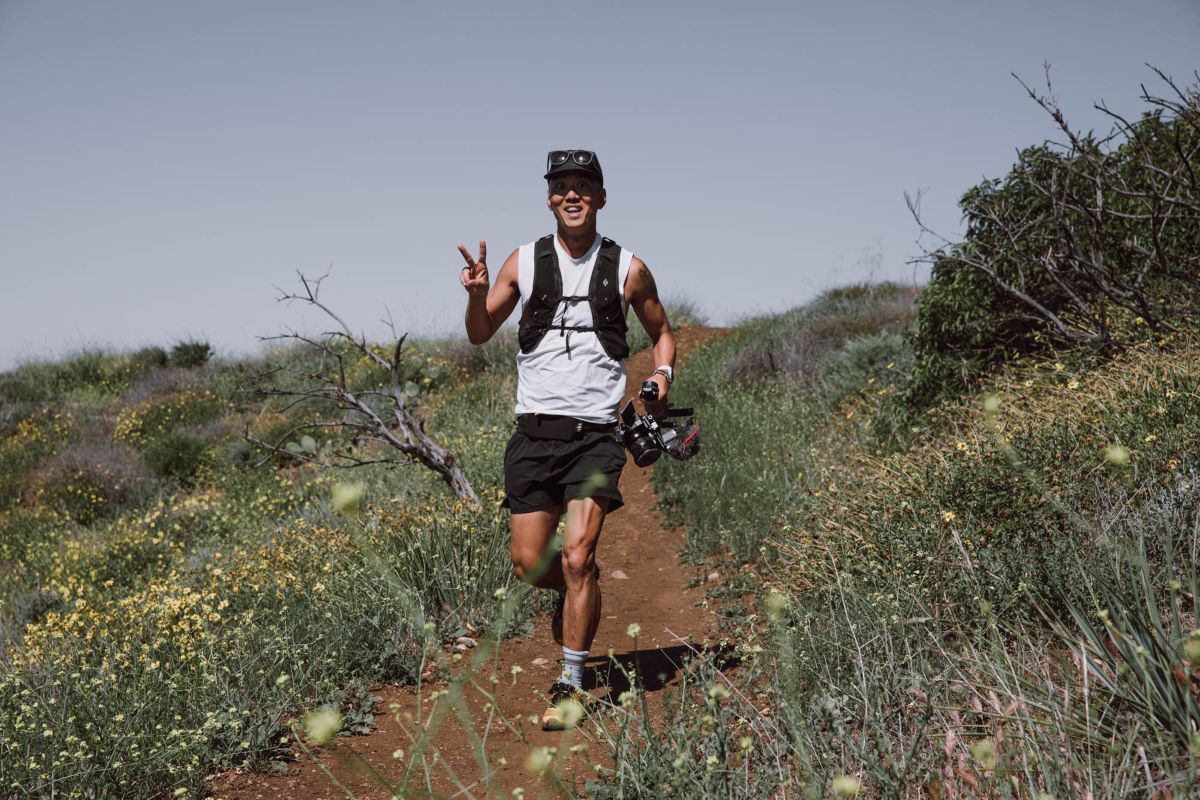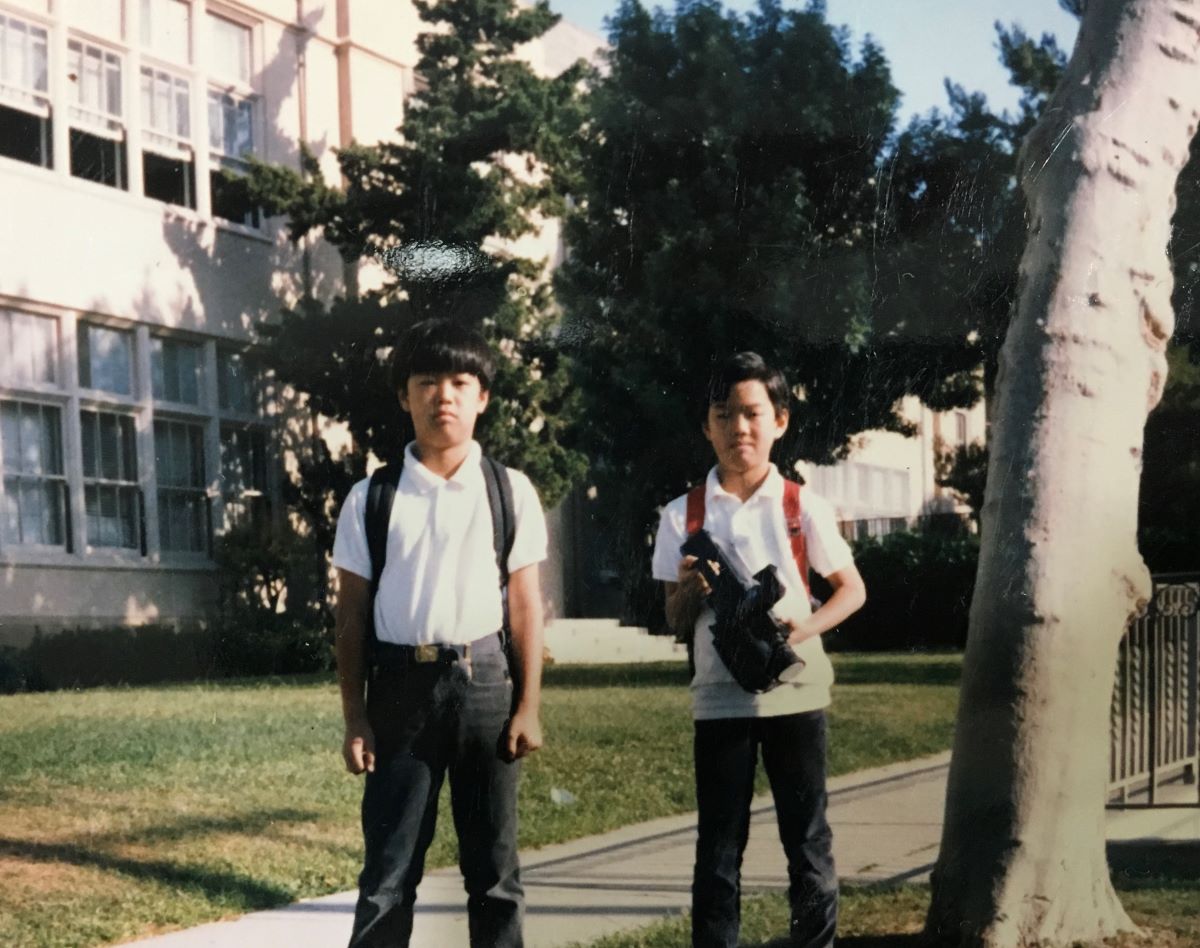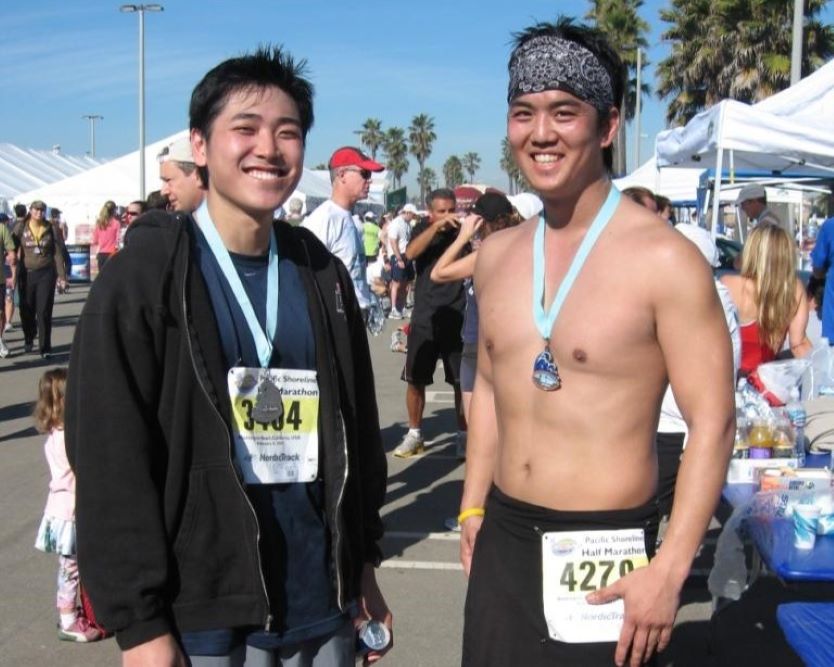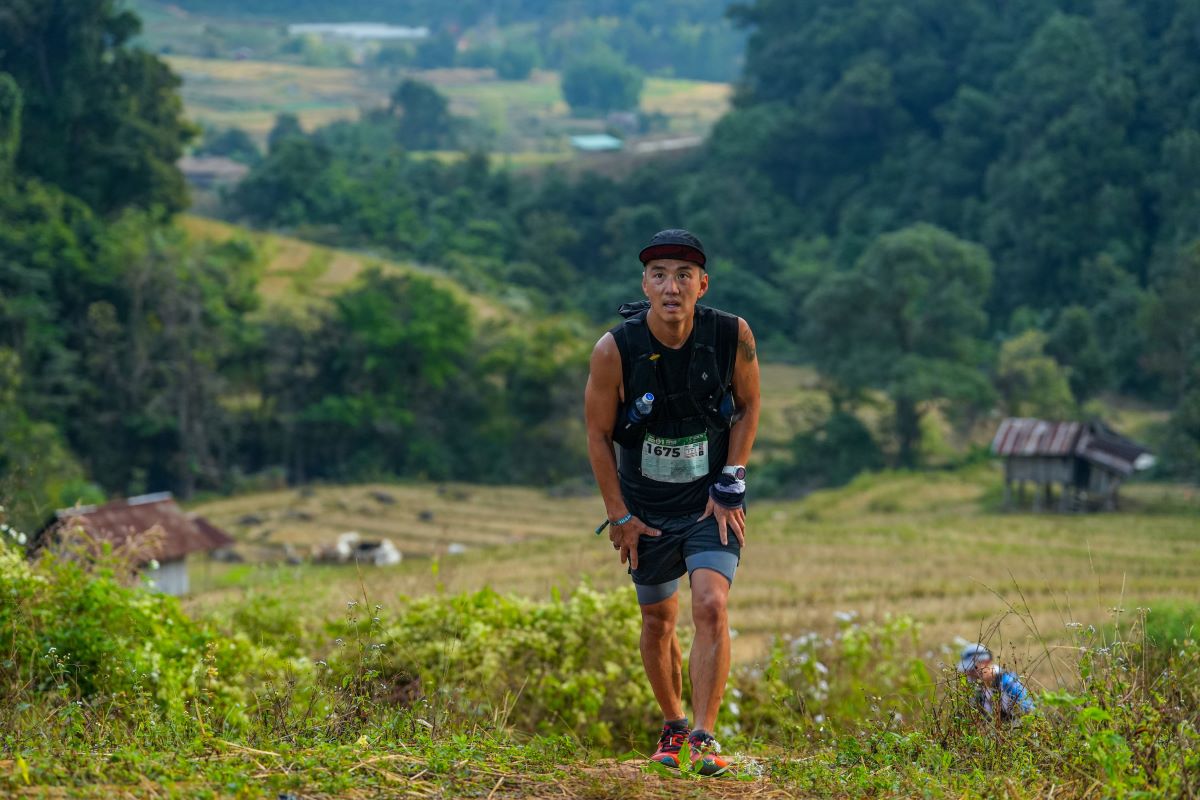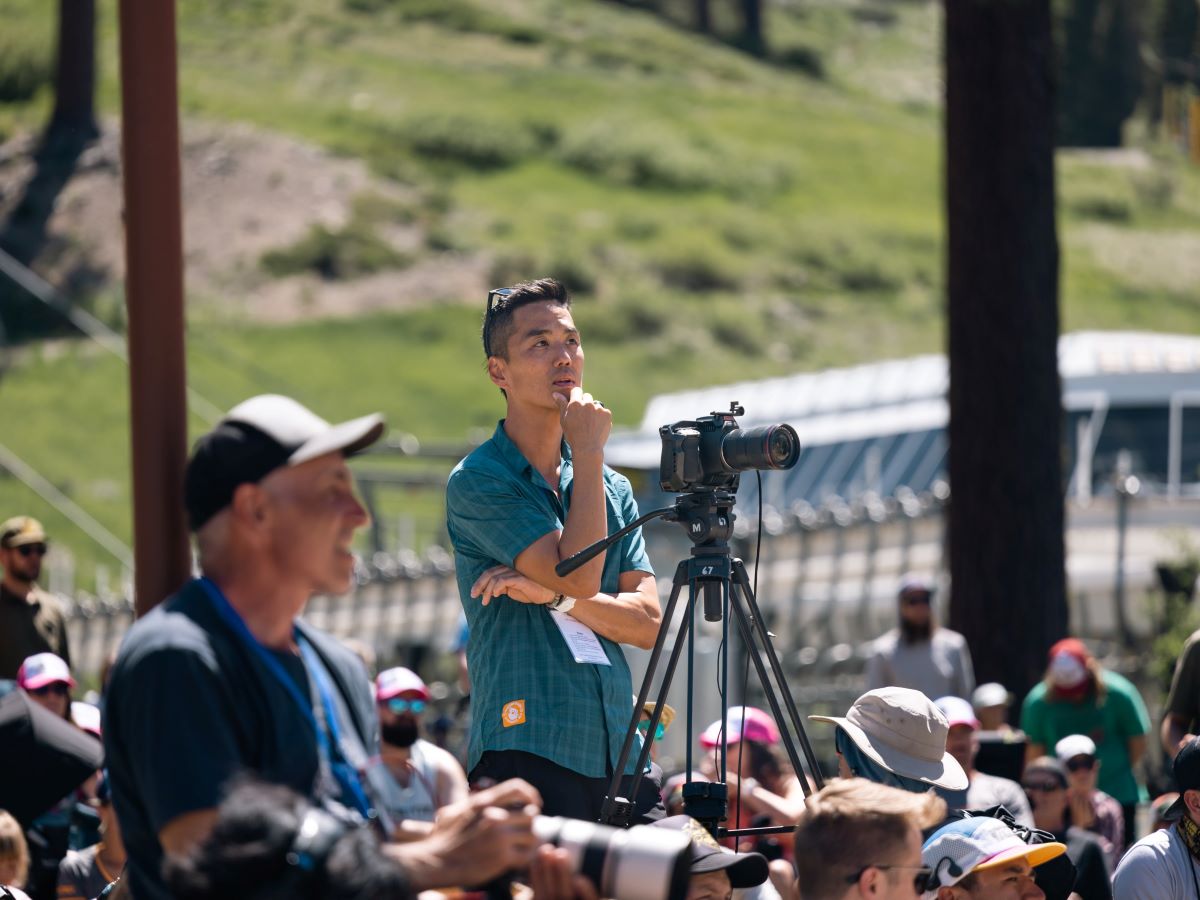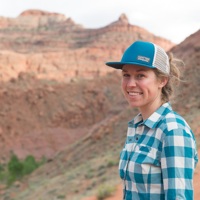Trail runner, filmmaker, and podcast host Billy Yang is renowned for running camera-in-hand alongside athletes on the most iconic race courses, sitting down with members of the community to record in-depth conversations, and toeing the start line as an athlete himself. Most recently, Yang stepped into the role of being a part of the 15-member board of the nonprofit Western States 100.
Born and raised in Los Angeles, California, Yang lives in the small beachfront community of Hermosa Beach, which he’s called home for nearly a decade. Growing up, he had a younger sister Connie and older brother Allen, and he was obsessed with football and basketball — running “seemed dorky or as they say, it was our punishment in ball sports. I didn’t take to it until later in life,” said Yang, who went through a highly gifted program from junior high through high school. To his “parents’ chagrin,” he started college but never finished.
“There’s the very typical Asian immigrant path of getting a high-level education, which I never quite subscribed to and it never felt right. I was always a lot more creative than I was book smart,” said Yang, and added, “I tested high IQ-wise and was surrounded by students who knew as a kid what they wanted to do, but I felt I didn’t belong. I knew my life wasn’t going to be that structured. I went into the future blindly, never knowing what my future would be but having a level of confidence that things would work themselves out.”
Yang went through a series of corporate jobs including a role in marketing. He was a smoker, “essentially directionless and leading a purposeless existence,” and living for drinking on the weekends. Then his dad was tragically murdered in 2004 when Billy was 27 years old, and everything changed.
“Losing my dad really forced me to become a man very quickly and to search for meaning and purpose. I thought becoming a police officer would accomplish that,” said Yang, who started running to get in shape for the police academy. Ultimately, he didn’t get the job, which was “the best thing that could have happened, because I’m not cut out to be a police officer, and I can’t imagine another scenario that would have led me down this path. It took a seismic shift to knock me out of the orbit I was on — that, more than anything, led me to find distance running and I’ve been doing it ever since,” said Yang.
Once he started running, Yang quit smoking, a habit he’d had for 12 years. In 2006, he signed up for a road half marathon with a friend and liked the experience, so he “kept the train rolling,” signing up for the 2007 L.A. Marathon. A year later, he discovered trail running through a local meetup called Trail Runners Club that met weekly on Sundays with a bunch of old-timers. The group was led by the late Stan Swartz, the author of “50 Trail Runs in Southern California.” He overcame his intimidation to run with the group and fell in love with the trails.
“I had no idea such green trails existed outside my back door. L.A. doesn’t have a big window of green space, but it was like I was transported to Scotland. I was blown away,” said Yang.
At the same time, Yang started the company High Gear Films, alongside Cody Westheimer, who was working on a film to share the story about losing his father to brain cancer. The loss resonated with Yang, and he started helping Westheimer, who lived a few blocks away at the time, to produce the film.
“I had no idea what I was doing other than piecing together the story. We premiered the film and decided to form a production company. He was more on the technical side, and I was more on piecing together the story and producer side. That lasted 1.5 years. Then he went back to full-time film composing. I continued as a hobbyist, finding people to profile and practically begged people to let me do a story on them,” shared Yang. To support his new passion, Yang reached out to Hollywood CPR (Cinema Production Resources) to attend a film program for a couple of years. He built a client base through non-endemic content, from marketing to real estate.
Throughout his creative career development, his running followed a linear progression, too. The then 31-year-old signed up for the 2009 Malibu Creek 50k, organized by the Pacific Coast Trail Runs (PCTR) group.
“It was two 25-kilometer loops, which is evil because after the first 25k, you pass by the main hub and you see people lounging with beer, chili, and sodas — and to be sent out on that second loop with the full California sun out … I didn’t want to head out, but I’m glad I did. The second half was a lot more miserable than the first. Then, you get the idea of ‘what’s next?’ You keep signing up for the next challenge,” said Yang.
Ultimately, it was the sense of community that hooked him. “The PCTR race series drew me in, because the race directors did such an excellent job of curating community and making sure every runner felt seen and acknowledged. That drew me in more versus the road scene where everyone is a face and a bib. The community aspect made me come back for more,” said Yang and not long after he signed up for his first 50 miler, the 2010 PCT 50 Mile.
By 2014, Yang decided to start producing creative materials about running. “I saw a dearth of quality running content that would inspire you to get out and go run. I saw a void,” said Yang, who dove in with a highlight reel of the 2014 Sean O’Brien 50 Mile, spotlighting several athletes including Sally McRae and Dominic Grossman. “When I posted the highlight reel, my social media blew up. It was this ah-ha moment of, ‘Oh wow, this is resonating with people,’” said Yang, who next captured the 2014 Lake Sonoma 50 Mile with Rob Krar, which was Zach Miller’s breakout race. A year later, he followed McRae on her Western States 100 journey, which was really when he started to “delve more into intimate, in-depth single-person storytelling,” he said.
Today, Yang has created dozens and dozens of films, many of which are available on his YouTube channel.
To date, several films stand out as particularly memorable for the producer. That high list includes “Zach,” which profiled a multi-year journey of Zach Miller “chasing a proverbial white whale to get the first win as an American [male] at UTMB,” said Yang, who first followed him to Europe in 2017, “when it was the most competitive men’s field ever assembled, with runners like Tim Tollefson and Kilian Jornet. He ended up finishing top 10, but it was a mixed-bag result. I thought the following year we should come back in case it happened — if he were to win, and I couldn’t document it, it would have ate at me. We went back in 2018 and 2019. The film itself evolved to telling more about Zach and his rise in the sport, and that resonates with me, because it was a true documentary. It wasn’t surrounding one event and was more a complete story about his parents and how their sense of work ethic was instilled in him,” shared Yang.
Another film completely exceeded his expectations with how it was received: “The Why,” which documents Yang’s experience of running the 2017 Leadville 100 Mile, remains one of the most popular films he’s ever created. “As a runner, I’m a middle-, or in some cases, back-of-the-packer. I didn’t have expectations for Leadville other than my day would be my day. I did want to approach and film it differently, and cast a wider net that speaks to the lay person versus people who know the ins and outs of ultramarathons. It was a very tough race; I was raw and forthcoming and showed not just high moments but low moments and that resonated with people,” said Yang. “The number of people who have told me they were racing Leadville because of that film or the comments I get about how “The Why” changed their life, or they ran their first 5k or signed up for their first marathon or they watch it before each race event — those comments blow me away,” he shared.
After seeing the popularity of “The Why,” Yang has stepped in front of the camera a bit more to offer short stories on his journey and some of his adventures. Then in 2017, he launched the Billy Yang Podcast.
“The podcast was something I’d long wanted to do as a fan of the medium. I was always a fan of talk radio when I was a kid, and I’d record faux broadcasts on tape recorders. It took me going to podcasters that I respect and listening to their first episodes and hearing everyone had a starting point. And it wasn’t perfect by any stretch of the imagination, and sometimes you dive in and grow as the audience grows,” said Yang.
“The first episode I recorded I was going to make it more of a narrative podcast. I did it and it just sucked — it was not what I envisioned, so I pivoted toward a one-on-one, or one-on-two podcast format, and I launched with Anton Krupicka,” said Yang. Today, he’s recorded nearly 75 episodes. Occasionally, the podcast takes a backseat while Yang juggles his other film and creative commitments.
For the podcast, “I severely lack in consistency of output. I care very much about authenticity and being genuine, and if you’re just banking episodes, that’s not the environment I thrive and work best in. The demand exceeds the supply in lots of instances. Where there’s video content and podcast content that hundreds if not thousands of people want more of from you — that can be a bit of a pressure to continually put out the level of content you’re used to and the audience is used to. That’s why you hear of creators getting burned out, and I don’t want to fall into that or be painted in that corner and create an unsustainable environment,” said Yang.
Of his role, he said it’s “been an absolute honor” to join the Western States 100 board. “I look back at my film I made with Sally, in 2014, that launched this whole endeavor. Western States was long on my bucket list of races I wanted to not only run but experience, and I got to do that through Sally. The book ‘Ultramarathon Man: Confessions of an All-Night Runner,’ by Dean Karnazes, was also a huge catalyst to me finding trail running and ultrarunning, and Western States was a huge part of that book. To see where my story started with road running and being intimidated to run with a trail group and the first time I drove into Olympic Valley, California, [where Western States starts] and being starstruck and wide-eyed. Now, almost a decade later, I’m a part of the 15-member board of directors — it’s like, how did I end up here? It’s been a lot of work, pressure, and it’s been super rewarding and great,” said Yang.
New for 2021, he spearheaded the live broadcast at Western States, which he’ll continue to develop next year for the 50th year anniversary of the race.
As for other new developments, Yang recently adopted a stray puppy, a blue heeler and Jack Russell Terrier cross named Charlie, who he came across on the side of a highway in Arizona while road-tripping to the 2022 Hardrock 100.
Ultimately, Yang’s motivations and connection to ultrarunning tie back to community and connecting with good, genuine people.
“The real allure of my first ultrarunning race were the people that hung out afterward, whose calves, ankles, and faces were covered in dust, and over bowl of chili or IPA you’re exchanging stories. That was the real distinction between triathlons or road races and the trail scene. Everyone has been so welcoming, lovely, and passionate about the sport — I can’t imagine a better community of people. It doesn’t matter if you’re Asian, in my case, or white or Black and everyone is so accepting and willing to help out. You could be dirtbagging in the back of your truck, or a Fortune 500 CEO and you would never know — this sport is class-less. It comes down to the people and that’s what makes the sport of ours so great and why I preach the gospel of trail running and ultrarunning. I think it’s the best sport out there.”
Call for Comments
- What’s your favorite Billy Yang film or podcast?
- Have any resonated with you in particular and why?
